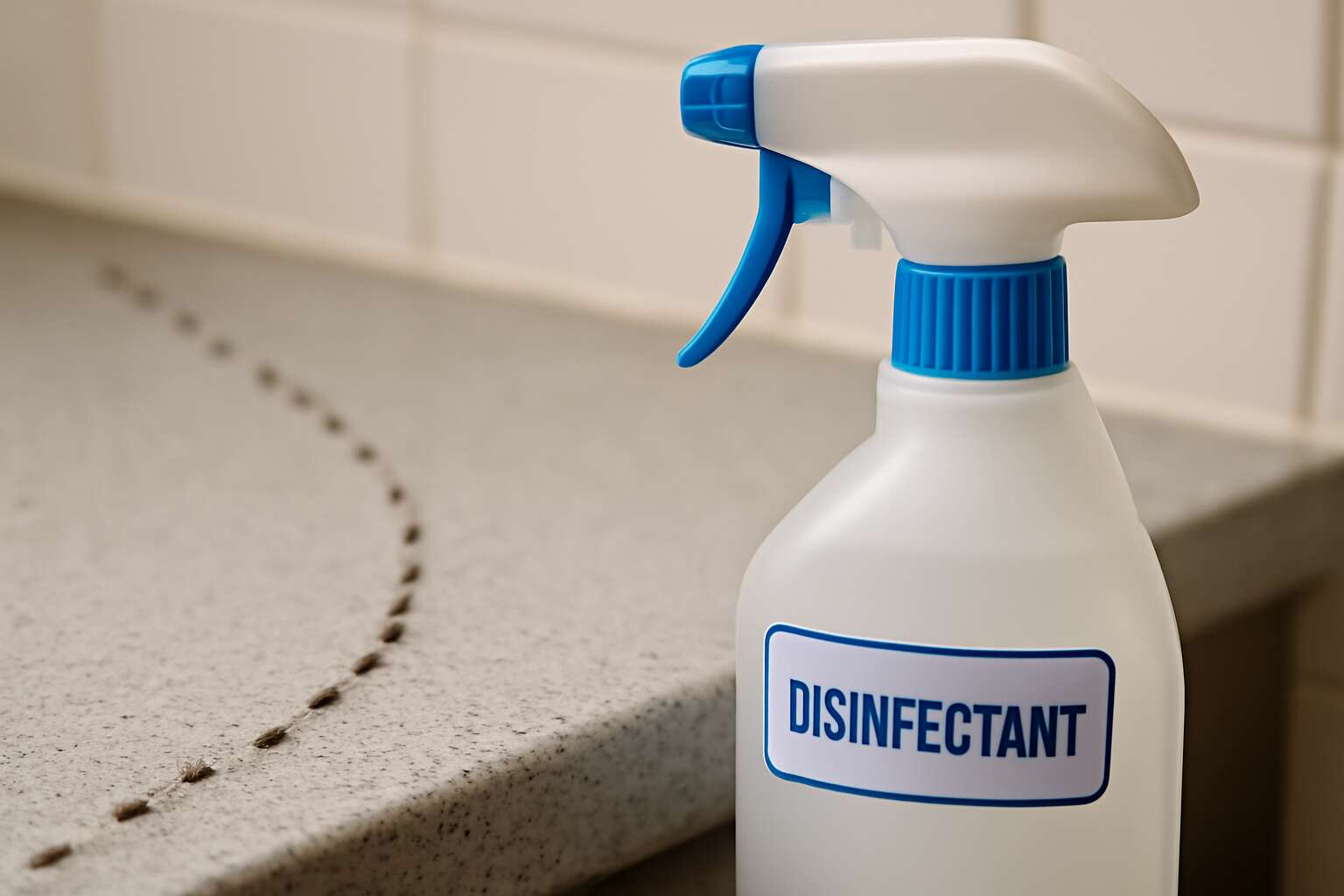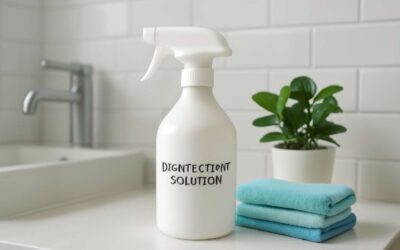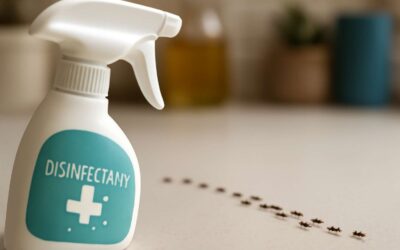Understanding Disinfectant Sprays and Their Composition
What Are Disinfectant Sprays?
In the shadowed corridors of pest control, understanding what lies within a disinfectant spray becomes paramount. These potent concoctions, often cloaked in mystery, are primarily designed to annihilate bacteria and viruses, wielding chemical warriors that disrupt cellular integrity. But can disinfectant spray kill ants? The answer is complex, woven with the layers of chemical composition and the resilience of these tiny invaders. Disinfectant sprays typically contain active ingredients such as quaternary ammonium compounds, alcohols, or phenols—each with a unique modus operandi against microbes.
While their primary purpose is sanitation, many wonder if these sprays can extend their lethal touch to ants lurking in the shadows. It is crucial to recognize that disinfectant sprays are formulated to target microorganisms, not insects. However, when sprayed directly onto ants, the chemicals can cause dehydration and damage their exoskeleton, leading to their demise. But, be warned—using disinfectant spray as an insecticide is neither efficient nor recommended, as it may not eliminate the entire colony and can pose health risks to humans and pets.
For those seeking a definitive answer—can disinfectant spray kill ants?—the answer hinges on the method and concentration of the spray. In some cases, a direct spray might temporarily incapacitate an ant, but it rarely eradicates the entire infestation. Instead, more targeted pest control solutions are often necessary to maintain a pest-free haven. Understanding the composition and limitations of disinfectant sprays ensures that your approach remains both safe and effective in the ongoing battle against these tiny invaders.
Common Ingredients in Disinfectant Sprays
Understanding disinfectant sprays requires more than just a glance at their label. These potent solutions are meticulously crafted to combat bacteria and viruses, often containing a complex blend of chemical ingredients. While their primary role remains sanitation, their composition reveals a layered purpose—one that may inadvertently affect small pests like ants. The core ingredients in disinfectant sprays include active compounds designed to disrupt cellular structures, making them lethal to microorganisms. But can disinfectant spray kill ants? That question invites us to look deeper into how these chemicals interact with living creatures beyond microbes.
Common ingredients in disinfectant sprays feature:
- Quaternary ammonium compounds, which are effective disinfectants but may cause dehydration in insects
- Alcohols, such as ethanol or isopropanol, capable of evaporating quickly and damaging exoskeletons
- Phenols, known for their germicidal properties, but potentially harmful when misused around pets and humans
These ingredients, while powerful against germs, are not specifically formulated to target insects like ants. Their efficacy depends heavily on concentration and direct contact, leading to only temporary incapacitation rather than complete eradication. The complex chemistry behind disinfectant sprays reveals that, although they might kill an ant on contact, they are not a practical solution for pest control—highlighting the importance of understanding what these products are truly capable of achieving.
Properties That Affect Pest Control
Amid the labyrinth of household products, disinfectant sprays stand out as potent guardians against germs, yet their true power to combat pests like ants remains shrouded in mystery. Surprisingly, studies reveal that a significant percentage of homeowners wonder, can disinfectant spray kill ants? The answer hinges on the intricate chemistry within these solutions. Disinfectant sprays are crafted with a blend of active compounds that target microorganisms, but their effects on insects are far from straightforward.
The core properties that influence their pest-control potential include rapid evaporation, chemical toxicity, and dehydration effects. For instance, alcohol-based disinfectants evaporate swiftly, leaving behind a thin film that can temporarily disable an ant on contact. Similarly, quaternary ammonium compounds may cause dehydration, but only if applied directly and in high enough concentrations. However, these ingredients are not formulated with insect eradication in mind, making their effectiveness limited and often inconsistent.
Understanding these properties reveals why disinfectant sprays are not reliable as ant-killers. Their primary function remains sanitation, not pest control, yet their chemical characteristics—such as quick evaporation and dehydration potential—can sometimes lead to brief incapacitation of small pests like ants. Still, the complex chemistry behind disinfectant sprays illustrates that, despite their might against germs, they are not a practical solution for managing ant invasions.
Do Disinfectant Sprays Kill Ants? An In-Depth Analysis
How Ants Are Killed
Ant invasions can be as unwelcome as an uninvited guest at a lavish dinner party—persistent and utterly disruptive. The question on many a homeowner’s lips: can disinfectant spray kill ants? The answer, surprisingly, is nuanced. While disinfectant sprays are designed to annihilate bacteria and viruses, their efficacy against ants is less straightforward. These sprays contain chemicals like alcohol, quaternary ammonium compounds, and phenols, which can temporarily deter ants but rarely eradicate the entire colony.
In truth, disinfectant sprays are not formulated to target the resilient exoskeletons of ants or their underground networks. They might kill individual ants if sprayed directly, but unless you’re prepared to spray every ant in sight—an unlikely feat—they won’t eliminate the problem permanently. For those seeking a more decisive solution, understanding how ants are killed involves recognizing their resilience and colony structure. They tend to survive exposure to disinfectants, rendering these sprays more of a surface-level deterrent than a true pest control weapon.
Effectiveness of Disinfectant Sprays on Ants
When pondering whether a simple spritz of disinfectant can banish the tiny invaders, many wonder: can disinfectant spray kill ants? The truth dances on the edge of reality, shimmering with nuance. While these sprays are crafted to annihilate bacteria and viruses, their effectiveness against ants remains elusive—like trying to quell a wildfire with a garden hose. Disinfectant sprays contain alcohol, quaternary ammonium compounds, and phenols, which may temporarily deter or incapacitate an individual ant if sprayed directly. However, they are seldom capable of eradicating the colony’s resilient core.
Ants are masters of survival, their underground tunnels and exoskeletal armor making them formidable foes. These pests thrive beyond the reach of surface-level solutions, and a spray meant for surfaces won’t penetrate the complex labyrinth of their colonies. So, in the grand chess game of pest control, using disinfectant spray is akin to moving a pawn—useful for a quick distraction but insufficient for checkmate.
- Direct spray kills isolated ants but fails to touch the colony’s roots.
Types of Ants and Their Susceptibility
In the grand tapestry of pest control, one question emerges with relentless curiosity: can disinfectant spray kill ants? While many envision the simplicity of a quick spritz banishing these tiny invaders, the reality is woven with complexity. Disinfectant sprays are crafted to combat microbes, not the resilient architecture of ant colonies. Their ingredients—alcohol, quaternary ammonium compounds, and phenols—may temporarily disable a lone ant, but they are powerless against the collective strength of an ant colony’s subterranean labyrinths.
Some ant species are more susceptible than others. For instance, fire ants and carpenter ants tend to be more vulnerable to surface contact with disinfectant sprays, especially when sprayed directly on the insects. However, their hardy nature means that the spray’s reach remains superficial at best. The intricate tunnels and hardened exoskeletons of these pests serve as natural armor, rendering disinfectant sprays largely ineffective for eradication.
- Ants’ underground colonies
- Resilience of their exoskeletons
- Limited penetration of surface sprays
Therefore, while a disinfectant spray might temporarily deter or kill a few individual ants, it is akin to striking a single wave in the ocean—impressive but ultimately insufficient to dismantle the entire colony’s fortress.
Safety and Risks of Using Disinfectant Sprays Against Ants
Health Hazards for Humans and Pets
While the question of “can disinfectant spray kill ants” might seem straightforward, the underlying safety concerns are far more complex. Disinfectant sprays are formulated to eliminate germs and bacteria, not pests. Using them against ants introduces a series of health hazards for humans and pets alike, especially when misapplied or used excessively. These chemicals often contain volatile compounds that, if inhaled or ingested, can cause respiratory irritation or even poisoning in sensitive individuals.
It’s crucial to recognize that disinfectant sprays aren’t designed for pest control. In fact, improper use may lead to unintended health risks, such as skin irritation or allergic reactions. For households with pets or small children, the danger amplifies. Accidental ingestion or exposure to residues can be quite harmful, and there’s little doubt that these substances are not meant for ingestion or contact with delicate tissues.
Therefore, if considering whether disinfectant spray can kill ants, remember this: safety should always be a priority. When using disinfectant sprays near living spaces, ensure proper ventilation, and keep pets and children away. Alternatives like natural repellents or professional pest control are often safer options—because sometimes, the greatest risk lies not in the pests themselves, but in the solutions we choose to eliminate them.
Potential Environmental Impact
The allure of quick fixes often tempts us to reach for disinfectant spray when ants invade our homes. But beneath its seemingly innocent fog lies a web of potential environmental repercussions. When disinfectant spray is misused or overapplied, it can seep into soil and water sources, disrupting delicate ecosystems and harming beneficial insects. The chemicals, designed to eradicate germs, may persist long after the initial spray, slowly entering the food chain and impacting local flora and fauna.
While the question of can disinfectant spray kill ants might seem straightforward, it’s vital to consider the broader environmental footprint. Using such sprays irresponsibly can lead to chemical runoff, which pollutes water supplies and endangers wildlife. For households seeking eco-conscious pest solutions, embracing natural repellents not only preserves the health of the environment but also averts unintended harm. Remember, sometimes the most potent solutions come from understanding the delicate balance of nature itself.
Legal Considerations and Safety Precautions
While the idea of using disinfectant spray to eliminate ants might seem tempting, it’s crucial to remember that safety and risks are at the heart of any pest control effort. Disinfectant sprays contain chemicals that can pose serious health hazards if misused, especially in homes with children or pets. Inhaling fumes or accidental ingestion can lead to allergic reactions, respiratory issues, or even poisoning. It’s always wise to exercise caution and avoid spraying in enclosed spaces without proper ventilation.
Legal considerations also come into play when using chemical sprays for pest control. Many disinfectant products are not registered as insecticides and may not be approved for pest eradication. Misapplying these substances could violate local regulations, leading to potential fines or legal action. In South Africa, adhering to environmental laws is essential to prevent unintended harm to local ecosystems and wildlife.
For those determined to combat ants, it’s better to opt for targeted solutions. If you’re asking yourself, can disinfectant spray kill ants? The simple answer is yes, but at what cost? Always prioritize safety by reading labels carefully, wearing protective gear, and considering environmentally friendly alternatives. Remember, sometimes the safest and most effective approach involves understanding the risks and making informed decisions that protect all members of the household and the environment.
Alternatives to Disinfectant Sprays for Ant Control
Natural and Chemical Repellents
While disinfectant sprays are primarily designed to sanitize surfaces, many wonder, can disinfectant spray kill ants? The answer isn’t straightforward. Disinfectant sprays may temporarily repel or kill ants upon direct contact, but they are not formulated as pest control solutions. For those seeking a more natural approach, essential oils like peppermint or tea tree oil act as potent repellents, creating an environment that ants prefer to avoid. Alternatively, chemical repellents containing ingredients such as borax or diatomaceous earth serve as effective deterrents, disrupting the ants’ exoskeletons or repelling them altogether.
Some homeowners opt for a layered strategy, combining natural and chemical methods to fortify their defenses against ant invasions. Here’s a quick glance at common alternatives:
- Essential oils (peppermint, tea tree)
- Borax-based baits
- Diatomaceous earth
In South Africa, where ant populations flourish in warm climates, understanding these alternatives can make all the difference in maintaining a pest-free home without resorting solely to disinfectant sprays. Ultimately, while can disinfectant spray kill ants temporarily, integrating natural or chemical repellents provides a more sustainable solution for long-term control.
Baits and Traps
In the ongoing battle against ant invasions, many wonder, can disinfectant spray kill ants? The reality is nuanced. While disinfectant sprays may cause immediate death upon direct contact, their primary purpose remains surface sanitation, not pest eradication. For those seeking effective alternatives, traps and baits offer a more strategic approach. These solutions lure ants, disrupting their foraging patterns and colony growth without the indiscriminate hazards of chemical sprays.
Using bait stations or homemade traps with sugar and borax creates a silent, persistent threat that ants carry back to their colonies, amplifying the impact. This layered approach—combining targeted baits with natural repellents—can be surprisingly effective in maintaining a pest-free environment. In South Africa’s warm climate, where ants thrive, understanding these alternatives becomes essential. After all, the goal isn’t just to kill a few on contact but to address the root of the infestation with finesse and patience.
Professional Pest Control Solutions
In the shadows of South Africa’s warm, relentless climate, the question persists: can disinfectant spray kill ants? The answer is as fleeting as a ghostly whisper—yes, but only in the briefest of moments, when the spray makes direct contact. Yet, relying solely on disinfectant sprays is like trying to seal a leaking vessel with a whisper—ineffective for long-term conquest. Instead, a more strategic approach emerges from the gloom: natural and professional pest control solutions that strike at the very heart of the infestation.
Alternatives such as bait stations and traps are silent assassins, luring ants with seductive scents and disrupting their sinister foraging rituals. These methods carry their own quiet menace, effectively carrying the threat back to the colony, amplifying their destruction. For those seeking a more refined touch, natural repellents—plant-based oils and herbal concoctions—offer a gentle yet persistent barrier that ants find uninviting. In the dark corners where these creatures thrive, understanding such layered defenses becomes essential to maintaining an environment free from their relentless invasion.
Proper Use of Disinfectant Sprays for Pest Management
Effective Application Techniques
In the intricate dance between pests and humans, understanding the proper use of disinfectant sprays can be a game-changer. While many wonder, can disinfectant spray kill ants? The answer is nuanced, but with the right application techniques, these sprays can serve as a formidable barrier against unwelcome intruders. When wielded correctly, disinfectant sprays not only sanitize surfaces but also disrupt the delicate trails ants rely on, effectively halting their march into your sanctuary.
Effective application begins with targeted spraying on entry points, ant trails, and nesting sites. It’s essential to follow the manufacturer’s instructions meticulously—overuse can diminish effectiveness and pose health risks. To maximize results, consider the following approach:
- Identify ant pathways and nesting zones.
- Apply disinfectant spray directly onto these areas, ensuring a thorough coating.
- Repeat the process regularly to maintain a pest-free environment.
By employing these techniques, you not only answer the question, can disinfectant spray kill ants, but also harness its potential as a strategic tool in pest management. Remember, precision and consistency are key to transforming a simple disinfectant into an effective barrier against these persistent invaders.
Best Practices and Warnings
Proper use of disinfectant sprays is crucial when considering their role in pest management, especially to determine can disinfectant spray kill ants effectively. While disinfectant sprays are primarily designed for sanitizing surfaces, their application in controlling ant infestations requires precision and care. Misuse or overuse can not only reduce their effectiveness but also pose health risks to humans and pets, making it essential to follow safety guidelines diligently.
For optimal results, target areas where ants frequently travel or nest. Applying disinfectant spray directly onto entry points, trails, and nests can disrupt their pathways and inhibit their movement. Remember, consistency in application is vital—repeated spraying helps establish a barrier that ants find difficult to bypass. Always adhere to the manufacturer’s instructions, ensuring the correct amount and frequency of use. This disciplined approach enhances the likelihood of answering the question, can disinfectant spray kill ants, with a definitive yes in certain scenarios.
However, caution must be exercised. Disinfectant sprays are not formulated as insecticides; therefore, their efficacy varies depending on the ant species and the concentration of active ingredients. Over-reliance on disinfectant sprays alone might not solve a serious infestation. Combining this method with other integrated pest management strategies provides a more comprehensive and effective approach. In South Africa’s diverse ecosystems, understanding these nuances can make all the difference in maintaining a pest-free environment.
Integrating Disinfectant Sprays Into an Overall Pest Control Strategy
Integrating disinfectant sprays into a comprehensive pest management strategy demands a delicate balance of precision and restraint. While their primary role is sanitization, understanding their capacity to combat ants can unlock new possibilities in controlling infestations. The key lies in applying disinfectant spray properly—targeting ant trails, entry points, and nests—without over-relying on them as the sole method of eradication.
Disinfectant sprays can kill ants when used correctly, but their effectiveness hinges on several factors. For instance, the concentration of active ingredients and the specific ant species involved influence whether a spray will produce results. To enhance their utility, consider combining disinfectant sprays with other integrated pest management techniques such as baiting or natural repellents. This holistic approach ensures that your efforts are both environmentally conscious and practically effective.
- Identify high-traffic pathways and entry points.
- Apply the disinfectant spray directly onto these areas, ensuring thorough coverage.
- Maintain consistency in application to build a barrier that ants find difficult to cross.
In South Africa’s diverse ecosystems, understanding the nuances of disinfectant efficacy becomes even more vital. As with all pest control tools, the goal should be to use disinfectant spray as part of a layered approach—one that respects the complexity of ant behavior and the environment. This thoughtful integration allows for a more sustainable and humane response to pest challenges, raising the question—can disinfectant spray kill ants? The answer, when used judiciously, is a definitive yes. Yet, the true power lies in how strategically it is employed within a broader, more intelligent pest management framework.




0 Comments